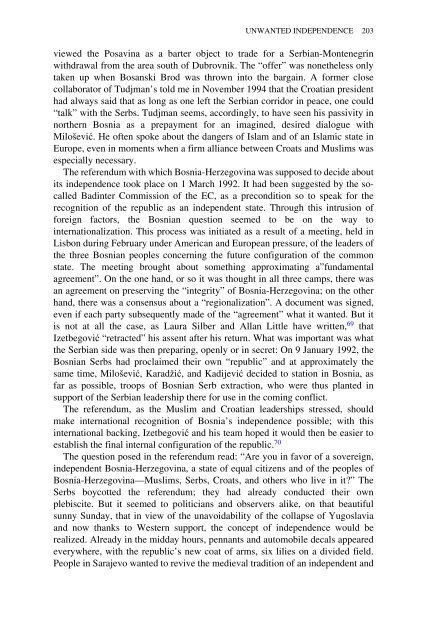Yugoslavia: A History of its Demise - Indymedia
Yugoslavia: A History of its Demise - Indymedia
Yugoslavia: A History of its Demise - Indymedia
Create successful ePaper yourself
Turn your PDF publications into a flip-book with our unique Google optimized e-Paper software.
UNWANTED INDEPENDENCE 203<br />
viewed the Posavina as a barter object to trade for a Serbian-Montenegrin<br />
withdrawal from the area south <strong>of</strong> Dubrovnik. The “<strong>of</strong>fer” was nonetheless only<br />
taken up when Bosanski Brod was thrown into the bargain. A former close<br />
collaborator <strong>of</strong> Tudjman’s told me in November 1994 that the Croatian president<br />
had always said that as long as one left the Serbian corridor in peace, one could<br />
“talk” with the Serbs. Tudjman seems, accordingly, to have seen his passivity in<br />
northern Bosnia as a prepayment for an imagined, desired dialogue with<br />
Milošević. He <strong>of</strong>ten spoke about the dangers <strong>of</strong> Islam and <strong>of</strong> an Islamic state in<br />
Europe, even in moments when a firm alliance between Croats and Muslims was<br />
especially necessary.<br />
The referendum with which Bosnia-Herzegovina was supposed to decide about<br />
<strong>its</strong> independence took place on 1 March 1992. It had been suggested by the socalled<br />
Badinter Commission <strong>of</strong> the EC, as a precondition so to speak for the<br />
recognition <strong>of</strong> the republic as an independent state. Through this intrusion <strong>of</strong><br />
foreign factors, the Bosnian question seemed to be on the way to<br />
internationalization. This process was initiated as a result <strong>of</strong> a meeting, held in<br />
Lisbon during February under American and European pressure, <strong>of</strong> the leaders <strong>of</strong><br />
the three Bosnian peoples concerning the future configuration <strong>of</strong> the common<br />
state. The meeting brought about something approximating a”fundamental<br />
agreement”. On the one hand, or so it was thought in all three camps, there was<br />
an agreement on preserving the “integrity” <strong>of</strong> Bosnia-Herzegovina; on the other<br />
hand, there was a consensus about a “regionalization”. A document was signed,<br />
even if each party subsequently made <strong>of</strong> the “agreement” what it wanted. But it<br />
is not at all the case, as Laura Silber and Allan Little have written, 69 that<br />
Izetbegović “retracted” his assent after his return. What was important was what<br />
the Serbian side was then preparing, openly or in secret: On 9 January 1992, the<br />
Bosnian Serbs had proclaimed their own “republic” and at approximately the<br />
same time, Milošević, Karadžić, and Kadijević decided to station in Bosnia, as<br />
far as possible, troops <strong>of</strong> Bosnian Serb extraction, who were thus planted in<br />
support <strong>of</strong> the Serbian leadership there for use in the coming conflict.<br />
The referendum, as the Muslim and Croatian leaderships stressed, should<br />
make international recognition <strong>of</strong> Bosnia’s independence possible; with this<br />
international backing, Izetbegović and his team hoped it would then be easier to<br />
establish the final internal configuration <strong>of</strong> the republic. 70<br />
The question posed in the referendum read: “Are you in favor <strong>of</strong> a sovereign,<br />
independent Bosnia-Herzegovina, a state <strong>of</strong> equal citizens and <strong>of</strong> the peoples <strong>of</strong><br />
Bosnia-Herzegovina—Muslims, Serbs, Croats, and others who live in it” The<br />
Serbs boycotted the referendum; they had already conducted their own<br />
plebiscite. But it seemed to politicians and observers alike, on that beautiful<br />
sunny Sunday, that in view <strong>of</strong> the unavoidability <strong>of</strong> the collapse <strong>of</strong> <strong>Yugoslavia</strong><br />
and now thanks to Western support, the concept <strong>of</strong> independence would be<br />
realized. Already in the midday hours, pennants and automobile decals appeared<br />
everywhere, with the republic’s new coat <strong>of</strong> arms, six lilies on a divided field.<br />
People in Sarajevo wanted to revive the medieval tradition <strong>of</strong> an independent and
















